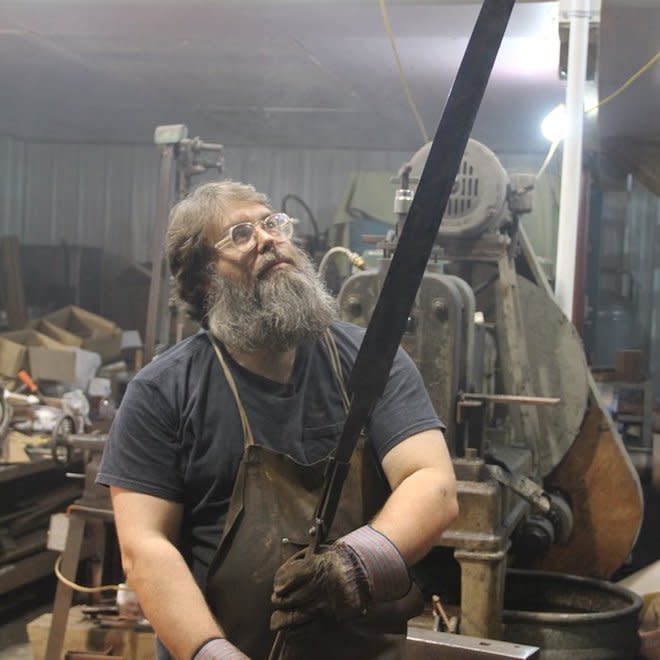In a PBS documentary on Viking swordsmithing, the world got a glimpse into deeply focused, masterful craftsmanship. It might have looked like a man hammering metal for eight hours to shape a sword, but this was a true master at work—carefully controlling the force and angle of every blow.
"I do all my work by hand and use tools that multiply my force without limiting my creativity or interaction with the material," explains blacksmith Ric Furrer, a specialist in ancient metalworking practices, a rare and intense art.

"To do it right, it is the most complicated thing I know how to make," Ric comments as he finishes. "And it’s that challenge that drives me. I don’t need a sword. But I have to make them."
Craftspeople like Ric are a rare breed, the subject of awe and envy for many overwrought knowledge workers who long for simpler times and focused occupations. While Ric’s craft may be rare, his intense focus on mastery is just as attainable—and important—for the modern day knowledge worker as it is for the artisan.
What Is Mastery?
Mastery is defined as "possessing authority and comprehensive knowledge and skill over a subject." In her book Rise: Creativity, the Gift of Failure, and the Search for Mastery, author and art curator Sarah Lewis elaborates on the definition of mastery as it relates to the craftsperson [emphasis added]:
Mastery requires endurance. Mastery, a word we don’t use often, is not the equivalent of what we might consider its cognate — perfectionism — an inhuman aim motivated by a concern with how others view us. Mastery is also not the same as success — an event-based victory based on a peak point, a punctuated moment in time. Mastery is not merely a commitment to a goal, but to a curved-line, constant pursuit.
A virtue lost in the frantic pace of modern life, mastery—the constant pursuit of excellence—can greatly influence your motivation and sense of purpose and meaning in life.
But how does one start this pursuit? The details of mastery will be different for every person and industry, but two skills are absolutely crucial when it comes to pursuing mastery in your own profession: The ability to focus on what's important and the ability to practice well.

Rediscover Meaning in Your Work Through Mastery
Mastery is a mindset: It requires the capacity to see your abilities not as finite, but as infinitely improvable.
Daniel Pink, author of Drive: The Surprising Truth about What Motivates Us
Forging a medieval sword, creating works of art from molten glass, or building a sailboat from scratch—these activities require an intense amount of motivation to see them from start to finish. Part of the allure of the craftsperson in our modern life is the intense intrinsic motivation and sense of meaning that they display in their work.
This is something most knowledge workers lack. Recent polls estimate that roughly 70% of workers are not engaged in their jobs.
To overcome this alarming deficit in meaning and motivation in the workplace, Deep Work author Cal Newport suggests approaching all work with a craftsmanship mindset:
The meaning uncovered [by craftsmen] is due to the skill and appreciation inherent in craftsmanship - not the outcomes of their work. […] The same applies to knowledge work. You don’t need a rarified job; you need instead a rarified approach to your work. […]
Whether you’re a writer, marketer, consultant, or lawyer: your work is craft, and if you hone your ability and apply it with respect and care, then like the skilled wheelwright you can generate meaning in the daily efforts of your professional life.
Author and speaker Daniel Pink elaborates on this concept when he describes important scientific research on the topic of motivation. (His TED talk on the subject is well worth the 18 minute watch.)
Scientists who've been studying motivation have given us this new approach. It's built much more around intrinsic motivation. Around the desire to do things because they matter, because we like it, they're interesting, or part of something important. And to my mind, that new operating system for our businesses revolves around three elements: autonomy, mastery, and purpose.
Autonomy: the urge to direct our own lives. Mastery: the desire to get better and better at something that matters. Purpose: the yearning to do what we do in the service of something larger than ourselves.
The pursuit of mastery, according to Pink, is a joy in and of itself, motivating workers to continually chase the mastery of their craft—whether that craft is metalworking, programming, teaching, or starting a business. That, above all, comes through practice.

Learn How to Practice Well
Don’t waste life in doubts and fears; spend yourself on the work before you, well assured that the right performance of this hour’s duties will be the best preparation for the hours and ages that will follow it.
Ralph Waldo Emerson
Many of us have heard of the "10,000-hour rule", which states that it takes ten thousand hours of practice to achieve excellence in any field. This idea has become widely cited as common sense.
But that’s not the whole story.
Author, journalist, and psychologist Daniel Goleman points out the primary problem with the 10,000-hour rule in his book Focus: The Hidden Driver of Excellence.
_The "10,000-hour rule"—that this level of practice holds the secret to great success in any field—has become sacrosanct gospel, echoed on websites and recited as litany in high-performance workshops. The problem: it’s only half true. If you are a duffer at golf, say, and make the same mistakes every time you try a certain swing or putt, 10,000 hours of practicing that error will not improve your game. You’ll still be a duffer, albeit an older one.
No less an expert than Anders Ericsson, the Florida State University psychologist whose research on expertise spawned the 10,000-hour rule of thumb, told me, "You don’t get benefits from mechanical repetition, but by adjusting your execution over and over to get closer to your goal."
In other words, you must master practice in order to create mastery through practice. Practice alone—simply dedicating time to repeat the actions you want to master—is not enough. Your practice must have your full attention, and you must have a goal of continually learning to practice better.
Focus Your Energy on Your Most Important Skills
In our increasingly hectic world, it’s no wonder that people are seeking solace in simplicity, in everything from capsule wardrobes to tiny homes. Simplicity has always been a quality inherent to the craftsperson: They don’t complicate their lives, workspaces, or craft with anything unessential. By mastering the tools and rules of their craft, they’re able to free their minds to focus on doing their best work.
This focus is a key tenant of mastery. The reason is simple: You cannot be a master of many things. A commitment to simply "do better at everything" in your job will result in scattered effort that yields few, if any, results. And while societal pressure pushes us in the direction of adding more and more balls to the juggling act of our life, the reality is that you have limited time and energy. You can’t add more of these precious resources—but you can decide whether to focus them or diffuse them.
As an example, think of light. When you focus a beam of light, it intensifies—think of the power that a lightbulb focused through a magnifying glass has to ignite dry grass or small bugs. However, when you diffuse that same lightbulb through a lampshade, you end up with dimmer light and less effective energy.
By restricting the number of tasks and skills you focus on, you're similarly able to get the most important things done consistently and get them done faster and better. To borrow from the philosophy that led to Unix's success: "Do One Thing and Do It Well."
But with so many skills and tasks playing into the job(s) you do every day, where should you focus your time and effort? You can’t expect to master every aspect of your job, but luckily you don’t have to in order to make a big difference.
This is thanks to what are known as keystone habits. "Some habits have the power to start a chain reaction, changing other habits as they move through an organization," says Charles Duhigg in his book, The Power of Habit. "Some habits, in other words, matter more than others in remaking businesses and lives."
These are the habits and skills that you should focus on when mastering practice. To identify these keystone habits and skills in your own life and profession, Charles Duhigg recommends:
Look for behaviors that have a ripple effect, changing your other behaviors without extra effort. And pay attention to how you see yourself when you do a particular habit. Does it change your self image? Do you feel better when you think of yourself as a person who flosses, a note-taker during meetings, a runner, or a person who meditates?
Practice in a Series of Focused Sessions
Programmer and author Kathy Sierra emphasizes the importance of focusing on keystone skills and habits when she describes deliberate practice as working on a skill that requires 1 to 3 practice sessions to master.
The process of actually practicing your key skills, then, should look something like this:
Identify the keystone habits and skills that play into the behaviors or tasks you’re trying to master. Keeping a daily journal of the actions and behaviors you want to master will help you start to notice important patterns.
Now break it down further. What is the smallest possible action or task you can realistically focus on for 1-3 sessions?
Set aside time for focused practice. This could be the time you would usually spend on the task (such as working out) or time outside that.
For that set time, focus all your attention and energy on doing that one action or task as well as possible.
Once you master this one, small behavior, move on to practicing the next small task. Then repeat this process to continue improving your core skills. This process, inevitably, leads to the last step: getting good feedback.
Find a Feedback Loop
Craftspeople often learn and hone their craft through apprenticeship with someone who's already mastered the craft. This is not incidental--it provides focus on a key element of mastery, one Goleman calls the "feedback loop." This feedback is key to making sure you avoid an echo chamber where your practice never actually improves.
Ideally that feedback comes from someone with an expert eye, and so every world-class sports champion has a coach. If you practice without such feedback, you don’t get to the top ranks. The feedback matters and the concentration does, too—not just the hours.
Sadly, this is a place where many of us get stuck. Managers are busy. Experts charge by the hour. Family may not be critical enough--or they may be too critical. How, then, can you find the kind of feedback loop that is so important to success?
Find—or build—a community. Whether it’s a community of like-minded coworkers, an online community (even a Reddit, LinkedIn, or Facebook group), or a local network, find a community of people with similar goals and a dedication to deliberate practice and growth. If you have trouble finding such a community, consider starting one!
Just remember that generosity is reciprocal. Ask yourself: What knowledge do you have that others may be seeking? What role can you play in building up a local or online community of experts?
To get you started, here’s a list of some of the top online communities for entrepreneurs, marketers, designers and developers.
Always be learning. A feedback loop can take many different forms. While a personal coach is perhaps a more direct source, don't underestimate continued education. Reading, in particular, gives you deep insight into specific topics from the minds of experts. These insights can then be applied to your own practice to create a feedback loop.
Ask. If you want feedback or advice, just ask! Whether you want feedback from a manager, colleague, family member, or an expert in your field, it never hurts to ask for advice. Tools like Clearbit Connect make this easier than ever. The worst they can do is say no, after all. Just remember that respect is key to building a good feedback relationship, whether you're asking for advice once or working with a peer or a potential mentor.
Business coach Michael Hyatt offers good advice about the ask in his article How to Find a Mentor to Help You Go Further, Faster. He's speaking specifically about a mentor, but this advice applies when trying to get feedback from a peer as well:
Though a true mentor may be difficult to find, it’s not impossible. If you have one in mind, start by building the relationship—just like you would anyone else. Don’t lead with "Will you be my mentor?" (That’s like asking someone to marry you on the first date.) Instead, get to know them. Look for opportunities to be generous. Start small and see where it goes.
Hire a coach. While not everyone can afford this, for some people in some professions, hiring a coach--even just for a few hours--may prove to be well worth the cost. A quick Google search will offer hundreds of coaching options. Take your time to hunt down the one that best fits your budget and goals or ask around for recommendations.
Regardless of your industry or profession, it is possible to pursue mastery. Better yet, it's highly profitable to pursue mastery. As discussed earlier, mastery will not only increase your skill, but will improve your motivation, as well as provide a sense of purpose and meaning in even the most boring industry. To close in the words of Amelia Earhart: "There is only one way in this world to achieve true happiness, and that is to express yourself with all your skill and enthusiasm in a career that appeals to you more than any other."
Keep Reading:
Keystone Habits: Improve All Areas of Your Life with One Small Habit
How to Build Habits That Stick: Small Wins Make a Big Difference
3 Science-Backed Ways to Boost Your Motivation (Even When You Don't Feel Like Working)
Blacksmith image by Clark Young. Ric Furrer picture courtesy of PBS. Amish Farmers image by Vladimir Kudinov. Master Carpenter image by Angelina Litvin.






